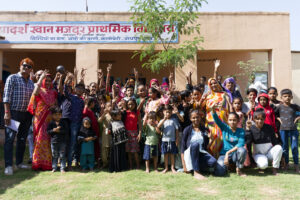Terms of reference of the standard
Scope and geographic application of the XertifiX Standard
- XertifiX controls production sites in China, Vietnam and India and certifies – in case of the compliance with the requirements – natural stones (for example, granite, sandstone, basalt, slate) from these regions.
- XertifiX performs the controls on behalf of the importer of natural stones. Accordingly, only the natural stones are certified, which are bought by the (ordering) importer.
- XertifiX controls all quarries and factories where the imported natural stones are mined and processed.
Why the XertifiX standard is necessary
In India, China, and Vietnam there is a plethora of laws that relate to the social needs of the workers’ and environmental protection. The problem, however, is that these laws are often insufficient complied with. For that reason the specific production conditions in India, China, and Vietnam have very often to be desired in terms of sustainability goals. In detail, it is, among other things:
- No usage of protective equipment
- No reduction of dust at work (e.g. no wet-processing of natural stones)
- No day of after 6 working days
- Regular overtime work
- No safety and first aid training
- No proper disposal of waste
- No recycling of water
- Etc.
Why the XertifiX standard can address these problems
The XertifiX standard was developed to address the most serious problems in the Asian natural stone production sites directly. The fulfillment of the standard would result immediately in the sustainable protection of employees and some basic environmental protection.
How XertifiX proceeds and why this works: XertifiX acts on behalf of the importers. And importers may require from their suppliers as a condition of trade that – besides the maintenance of quality standards – the social and environmental standards in the production of the purchased products are complied with. Concretely, the importer relies on the cooperation with the independent organization XertifiX whose standard is to fulfill gradually or totally (PLUS label). Especially the possibility of a gradual fulfillment of the requirements also invites smaller producers (with limited resources) to participate in the project .
XertifiX will then perform announced and unannounced inspections in all supplying quarries and processing factories. After each control an audit report is prepared, the “non-compliances” and “Corrective Action Requirements” are set. Additionally, XertifiX offers to mediate training courses and workshops. This enables the companies to achieve the sustainability goals within a reasonable time-frame.
Results that will achieve the standard XertifiX
Social results
- No child labor, no slave labor, no discrimination
- Union activity / collective bargaining
- Payment of fair wages
- Fair working hours according to the ILO
- Gender equality
- Adequate housing of the workers
- Safe work and a safe working place
- Information to all workers about the goals of the XertifiX approach, particularly the workers’ rights
- Protection of the health of the workers
Environmental results
- No negative environmental impacts in the surroundings of the production sites
- Waste disposal is done in accordance with national law
- Reduction of water and energy consumption
- Reforestation and restoration of the ecosystem
Risk assessment for the application of XertifiX standard
Factors that may complicate the implementation of the standards XertifiX
- In Germany: Other standards that demand less, are cheaper, and yet satisfy the (minimum) standard requirements of public procurement purchasers. This distorts the market to the disadvantage of XertifiX.
- In Asia: The unwillingness of Asian producers to improve the production conditions according to the standard criteria.
Non-intended negative consequences that can bring with it the implementation of the XertifiX standard
- Shortage of labor: certain requirements such as the obligation to wear personal protective equipment may deter workers to continue working in this factory. The Non-intended consequence of the default implementation of the standard may therefore be a shortage of labor.
- Short and medium term higher production costs by way of fair wages and working hours, investment in occupational safety and environmental protection etc.
Potential corrective actions that can mitigate these negative consequences
- Workshops and training, which illustrates all concerned parties that the improvements are for the benefit and to the advantage of all involved
- Improved ownership on part of all parties involved in the Asian production sites in terms of the desired standard through appropriate communication during the audits, workshops, and trainings
- Improved understanding among Asian producers concerning expected future developments in European importing countries: an increase of the social and environmental requirements by the public procurement and the public in general
- Lobbying by XertifiX for maximum transparency in all labeling initiatives regarding the requirements for obtaining a certificate
